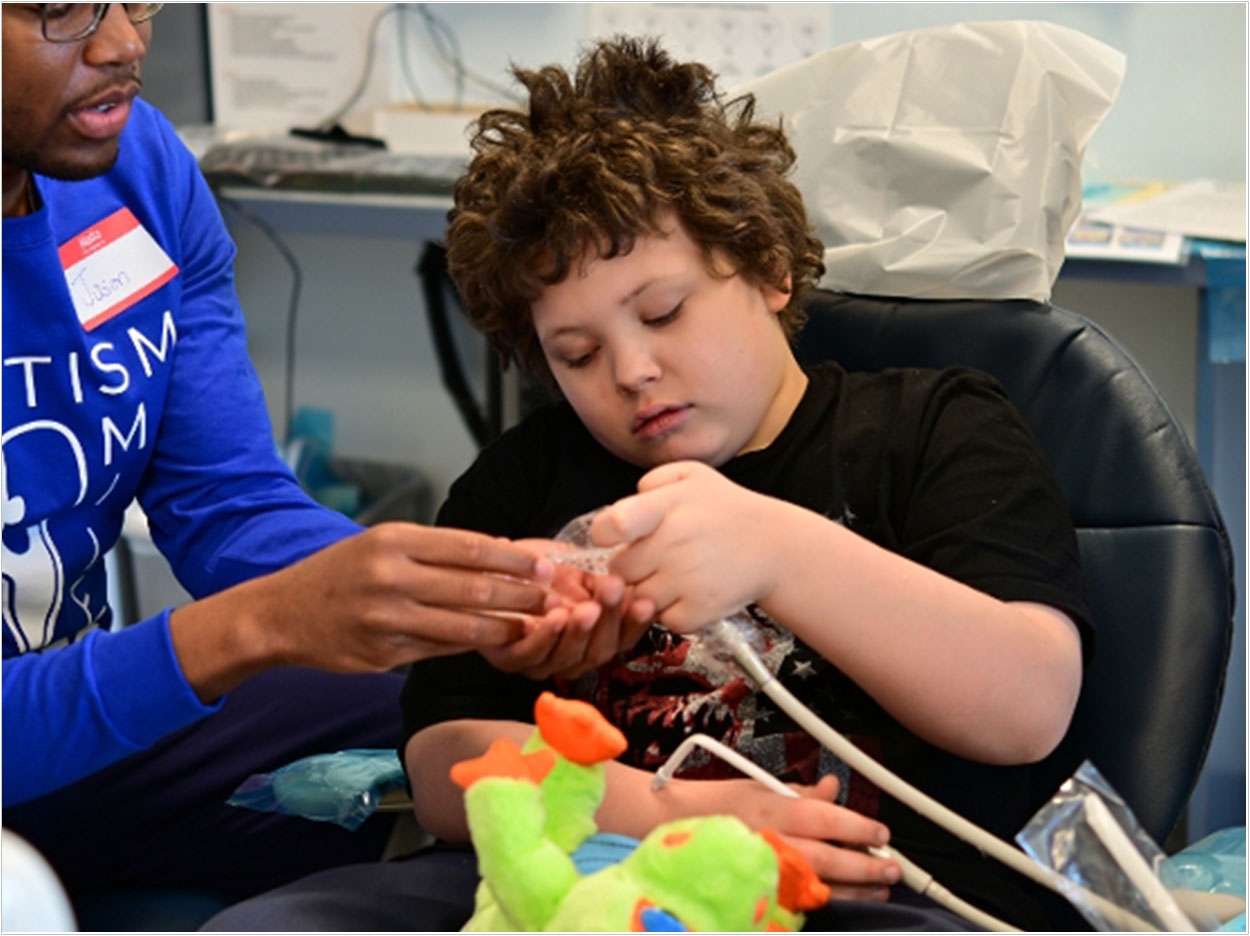
Dental visits can be a challenge for children diagnosed with an autism spectrum disorder (ASD) who have sensory and spatial issues as well as communication difficulties. The Tufts School of Dental Medicine, however, has launched a program called Autism Smiles that lets these children visit the dental office and get to know the environment before treatment even begins.
“Our dental visits were something of a nightmare,” said Maggie Johnson, whose son Alex is on the spectrum and a third grader at Joseph Lee School in Dorchester, Massachusetts. “He wouldn’t let the dentist touch him. Once, he bit him.
But once Alex brought home a flyer from school advertising Autism Smiles, Maggie was eager to sign up. The 14 children who attended the event did not get cleanings, treatments, or even basic exams. Instead, they got to experiment with the dental equipment themselves, learn about what dentists do from Tufts students, and sit in the dental chair.
Autism Smiles is modeled on Logan Airport’s Wings for Autism program, where children can visit an airplane before taking a flight. With about one in 59 children in the United States diagnosed with an ASD, according to the Centers for Disease Control, experiences like this are needed, said Kathryn Dolan, RDH, MEd, assistant professor of public health and community service at the dental school and supervisor of the school’s outreach programs with Boston public schools.
Autism Smiles grew out of the final project of a group of first-year dental students who were taking a course in health literacy and wanted to put what they were learning into practice.
“Fear is the biggest thing that keeps a lot of clinicians from working with people with disabilities,” said D22 student Jason Cummins.
For the dental students, particularly those who hadn’t yet had their rotations in pediatrics or at the special needs clinics that Tufts operates throughout Massachusetts, it was an opportunity to learn more about caring for an underserved group of patients.
The pilot program took place earlier this year, and faculty and staff from the Department of Public Health and Community Service and the Department of Pediatric Dentistry are hoping they can do another session in the fall, said Nancy Marks, community service learning coordinator.
Not all of the children were comfortable getting into the chairs in the school’s pediatric clinic, though some who were apprehensive at first eventually went in, the school reports. In the operatories, the children had a chance to squirt water, shine lights, and ride the chair up and down, among other things they would experience during a dental checkup.
“One little girl was nonverbal, but as soon as she sat in her dad’s lap in the chair, she started touching the equipment, then playing with it, and that process of being desensitized to the operatory was a good step,” said Cummins.
The students and faculty reached out to the children wherever they were needed to, the school says, even if that meant doing their presentations in the waiting room or in the hallways.
“You have to tailor the experience to the child, and every child is different,” said Vendita Correia, a D20 student and president of the Tufts student chapter of the American Academy of Developmental Medicine and Dentistry.
“Autism means so many different things,” said Correia. “Some kids don’t need as much accommodation, and some need a lot. It’s important to recognize the diversity of healthcare needs among all the children, despite that one diagnosis.”
The program also emphasizes the way that families could continue the experience at home.
“We didn’t want it to be an event that happens only for a day, and then people go home and try to remember what they learned,” said Martha Forero, RDH, DDS, MS, assistant professor of pediatric dentistry. “It’s important that we work with the parents and the caregivers.”
The school gave each family a bag with a book available in English and Spanish, tooth-brushing timers, flossers, and other giveaways, including a small, handmade weighted blanket that may be used to calm children who are feeling anxiety.
Since the program, Alex and his mother have been talking about the dentist a lot in preparation for an appointment this summer. Maggie used to have to brush Alex’s teeth for him, but since the program, that has changed.
“He’s now brushing his teeth twice a day, all by himself, which is fabulous,” said Maggie. “He says, ‘I got this!’”
Related Articles
Children With Autism Face Varied Oral Health Risks Across the US
Desensitization Training Improves Dental Visits for Children With Autism
Q&A: Dr. Romer Ocanto Discusses New Autism Training












